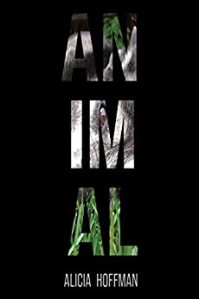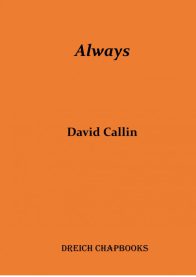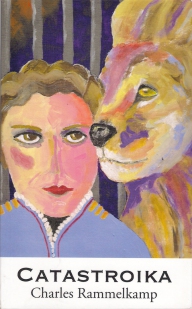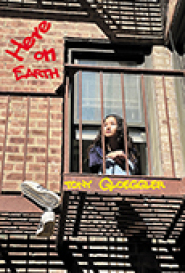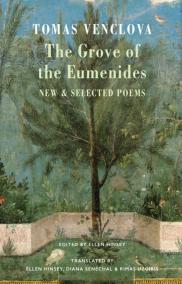
Alicia Hoffman, Animal, FutureCycle Press, 2021. ISBN-10 1952593107,
ISBN-13 978-1952593109. £11.51. 88pp.
We Become the Animal
When I’ve lost an animal, no one has suggested to me I should find a support group or go to therapy, though my grief and sense of loss rival any I’ve felt from human deaths. Loss of an animal companion isn’t on the list of the five most stressful life events (death of a loved one, divorce, moving, major illness or injury, or job loss—I’d add in pandemic at this point as well) though I know from my own experience as well as friends’ that such a loss is devastating.
This type of grief is rarely charted territory. Friends will console on Facebook after a pet dies, but there won’t be a constant checking in after a couple of days. In fact, we, the animal mourners, might harbor shame that we are feeling such unutterable sadness that Pippin, Coffee, Jenny, Peanut, or Bean are gone that we hush and chastise ourselves—or rush down to the ASPCA to find a replacement as soon as possible to stave off the ridiculous and acute feeling of bereavement.
What if we managed to delve into the feelings of loss, the feelings of animal that we carry inside ourselves? What if we looked to our animal companions, those on this life ride with us for understanding and wisdom? Amazon lists over a thousand books about the loss of a pet, but literature rarely provides room for such feelings to flow.
In her third poetry collection Animal (FutureCycle, March 2021), Alicia Hoffman lets her imagination seep into such grief and allows us all to stay a while. This is not a collection solely about animal loss, but that current beats in and amongst the poems where animals serve not only as teachers but metaphors, talismans, hope. In these poems, too, we can become the animal. We can be taught by them, too. It is the loss of them leads to a loss of self unless we look to them, follow behind, hold on, see. Here, animals are our teachers. Our souls.
The dedication at the opening of Animal—for Jinxie—gives us a clear clue. Jinxie is a name, of course, a pet (teacher, guide) whose importance is presented early on. In “A Quick Departure of Grief,” we see how a dog takes the speaker out of grief and into the world, wide and large and electric: “today/ she will discover all the new smells// and pee all over them and be glad…Today,/ even the moon is woven with cotton,// a dream stitched neat as a button, clear/ as bleach against this pure wash of sky.”
The dog guide leads her out, allows her this journey, this respite from sadness and likely herself. Yet, what to do when the dog is no longer there to lead. In “Animal Loss,” we learn that “…Today, my cattle dog trembles from arthritis…I cannot reconcile her growing old with leaving.” And really, can any of us reconcile growing old with leaving? I know I can’t.
What do we do when our animals begin to leave us and then are gone, either from old age or maltreatment on a huge human scale? How do we cope? Do we cope? Are we able to learn? Might we finally understand death and life better? Maybe some of all. In “January Elegy,” the speaker tells us:
….From here, the field
is vast, open, indecipherable. From here,
we can draw any conclusion. We can run
till we decide we can run no longer. We can
curl into the memory that holds our love
in its name, straddle any choice like a god
changing her mind. Between going forward or
looking back, I will always choose to miss you.
It’s a given. How the wings of grace arrive…
By the end of this remarkable collection, we are connected to the speakers, to the animals, to the events that are provided us in image, in idea, in metaphor. In the last poem, “Alexa Plays Miles Davis,” we are with a speaker as she prepares a meal, listens to music, considers the connections of everything, the people, the planet, and the creatures that inhabit it. She tells us:
…I am in my kitchen,
and in Southeast Asia the same sun shines
as someone flees from genocide. Someone
thinks only survival as I waste vegetable scraps,
playact at wonder, as the world’s music barrels in
and animal voices in their anguish keep me singing.
The great horror and wonder, all at once, keeps these speakers singing. There, in each poem, a tribute to the brutal and beautiful. Hoffman’s collection pays homage to all our anguish and the stories that make us sing.
Jessica Barksdale
To order this book click here
Jessica Barksdale’s second poetry collection Grim Honey was published April 1, 2021 (no joke). Her fifteenth novel, The Play’s the Thing, will be published May 18, 2021, the forty-first anniversary of the explosion of Mount Saint Helens. No joke either. Recently retired, she taught composition, literature, and creative writing at Diablo Valley College in Pleasant Hill, California for thirty-two years and continues to teach novel writing online for UCLA Extension and in the online MFA program for Southern New Hampshire University. She lives in the Pacific Northwest of the US with her husband.
David Callin, Always, Dreich chapbooks, £5
I have known David’s poems for many years, from when we first met in online forums, and have always had a great affection for his careful language and image. This small collection is well overdue. I had forgotten, until I read the poems as one group, how adept he is rhyme and meter. I have never thought of him as a purely formal poet, perhaps because his talents are always used with subtlety, but the skill is here.
I wondered about the choice of Always as the title as many of these poems record loss – pubs, people, ways of life, all swirled by time and change. Here they are affectionally and often humorously commemorated – meeting Elvis on a country road is followed by a lament that the Romans never did anything for the Isle of Man, passing by in search of somewhere more lucrative:
On excited beaches,
woaded to the IX’s,
my aboriginal ancestors might have been waiting
with fresh herrings
or our excellent blueberries.
Caesar could have had some jam for tea.
- itself of course a reference to the dog Latin Caesar ad sum iam forte.
These are gentle poems but sharp in their observation, always willing to err on the side of kindness; much like the man himself. The most moving are written in memory of the poet’s sister, Rosemary. Remembering and the attempt to come to terms with loss are vividly described, though not perhaps in ways you might expect. Here a lighthouse top, ‘shining like/a hat fit for a hero’ brings her presence at a picnic to mind:
You seem to see very far.
Your gaze, coming back to us,
was like a fond full beam that
lingered briefly and moved on.
My favourite, I think, is A theft, with its quiet anger:
A theft is taking
place,
although the universe
might call it repossession -
the dissolution
of one configuration
of walking talking atoms,
compound of fear and hope,
back into the soup;
the payment on due
date
of a long outstanding debt.
These poems, I understand, are drawn from some of the poet’s earlier works. I very much look forward to the next instalment (‘perhaps a little/ polite high jinks/with some suspiciously /sexy sphinx’).
Rosemary Badcoe
To order this book click here
Rosemary Badcoe’s collection Drawing a Diagram is available from Kelsay Books https://kelsaybooks.com/products/drawing-a-diagram She was editor of the now retired Antiphon https://www.antiphon.org.uk
Charles Rammelkamp, Catastroika,
Apprentice House Press, 2020.
ISBN: 978-1-62720-298-5. 123pp. $12.99.
A previous reviewer of Catastroika, Clarinda Harriss describes it as “a historical novel-in-verse”. I see no reason to argue with that while recognising that this blurring of genres may incur the ire of traditionalists in their Canute-like monitoring of such matters. They should wake up to the fact that the novel-in-verse is now an established genre and which has over the last forty years or so in fact proliferated. There are numerous examples including by such high profile and respected writers as Nabokov, Derek Walcott, Les Murray and Vikram Seth. Perhaps more surprisingly the form is enjoying considerable currency in the field of contemporary young adult fiction.
Charles Rammelkamp adds to the genre with a take on nearly a century of Russian history from the late nineteenth to the late twentieth in the voices of a fictional Russian Jew, Alexander Federmesser (Sasha) and Maria Rasputin who was the daughter of the notorious Grigory Rasputin. The scope of Catastroika is ambitious but does not fall short in the execution. This is achieved not on an epic scale but by a more intimate approach restricted to the viewpoints of the two lead characters.
The book is divided into 9 parts, alternating between the perspectives of Sasha and Maris, with each part containing a varying number of poems that function like chapters and are all dramatic monologues. Interestingly the title of the opening poem in the narrative, Call Me Sasha, echoes the famous opening sentence of that great American epic, Moby Dick, itself a blending of genres ahead of its time, anticipating approaches that were later realised in modernist and meta-fictional works. Perhaps this nod is Rammelkamp’s way of acknowledging that presence while at the same time establishing that what he is attempting is altogether different in execution. On the other hand it could be nothing more than a sly joke.
The tone adopted throughout is conversational. Frequently the language is reminiscent of someone responding to questions from an unseen interviewer for a television documentary. One poem begins: Yusupov? The shlump who killed Rasputin? That this tone is maintained exclusively is to Rammelkamp’s credit. He could so easily have resorted to passages invested with lyricism but this would have compromised the integrity of the work’s register and the voices of Sasha and Maria. As a point of comparison, the dramatic monologue Frieda Pushkin by B H Fairchild exists at the other extreme where the tone of the piece is very much more poeticised, requiring a greater willing suspension of disbelief from the reader. Fairchild favours the payoff of heightened language whereas Rammelkamp sticks without wavering to verisimilitude and authenticity.
The novel is presented as verse, in short lines, where the temptation might have been to write prose poems. This seems to be a declaration of intent and offers the reader a way to more easily assimilate the weight of historical narrative covered. It also allows the strategic and effective deployment of telling detail that illuminates the text, the amputated penis of Rasputin being perhaps the most memorable. Traditional metre is not employed. One might have expected blank verse for instance but Rammelkamp has plumped for vers libre, with the lines randomly varying in syllable count, although within each line these are often regular. In terms of readership, lineation will probably scare away those who are poetry averse and reflexively shy away from anything presented in short lines but who would read exactly the same content rendered in prose. But for those of us who are open to the attractions of the verse novel I am sure Rammelkamp’s Catastroika will prove a hit and be recognised as a remarkable achievement.
David Mark Williams
To order this book click here
David Mark Williams writes poetry and short fiction. He has two collections of poetry published: The Odd Sock Exchange (Cinnamon, 2015) and Papaya Fantasia (Hedgehog, 2018). For more information go to www.davidmarkwilliams.co.uk
